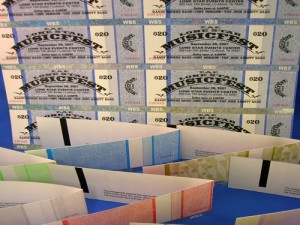

This past Saturday, one of my favorite bands played a concert at the Vogue Theater. I had known months in advance that tickets had sold out in seconds, but thanks to Craiglist, I was able to snatch a pair from a reseller. While standing in line that evening, there were the typical event scalpers. Even on the small entrepreneurial scale, accounting terms such as “inventory”, “opportunity costs”, and “liquidity” are essential to conduct successful business.
For a ticket scalper, his inventory is the # of tickets which he has purchased. Their liquidity (in this case, how fast they can sell their tickets for cash) is dependent on the ever-changing demand for the event. And demand and price vary as the date of the event draws closer. Because tickets have a termination date, scalpers suffer greatly if they have excess inventory as unsold tickets are a permanently loss. It was stated in class on Oct. 19th that “opportunity cost doesn’t get an invoice, but it can be the most important cost”. This is especially true in the ticket sale industry.
This example of ticket resale shows how accounting and economics are both connected and very prevalent in everyday activities.
